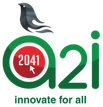Big Data
BIG DATA ANALYTICS LAB
First-of-its-kind lab in Bangladesh to strengthen government agencies with data analysis and visualization to bring about social good
Big Data Analytics Lab: Harnessing Big Data for Social Good
a2i’s big data initiatives for Big data research encompasses the use of a large volume of data in both a structured and unstructured form including public utility consumption data such as electricity, gas and water consumption in the urban and rural areas. By default, big data research requires harnessing insights from very large volumes of data.
The goal of a2i big data research is to harness the power of Big Data to help formulate public policy and decision making for capacitating government agencies and ensuring public good, by providing innovative and ICT-based public services based on data-driven decisions and applications. For more information, see the innovation brief on “Data2Policy”.
Also to capacitate the government agencies, a2i initiatives on big data research will gradually address all forms of data including sensor data, transaction data, live image data, GPS data, CDR data, and public utility consumption data. The Lab aims to provide support to strengthen government agencies with data analysis and visualization and set examples to make the process into practice. The lab has been working to visualize data with analytics for documentation and dissemination for the government’s departmental policy decisions adopting the algorithmic approach to make government agencies enabler rather than a solution provider.
Correlation is the most important part where more effective insights will be got if this happened to big-size data. This well-equipped Lab improves the open access to data for the government to develop a Data-Smart Government to ensure transparency, accountability, participation and inclusion.
Several projects are now running as big data initiatives:
Big Data Analytics Gaining Traction within Government
A relatively new concept in Bangladesh, Big data Analytics is being molded to the decision-making needs of the government to ensure better public service delivery. Consequently, policy-making and implementation will become more citizen-centered and sensitive to citizens’ needs, preferences and experience of public services. This will create scope for improvement in the quality of services provided by the government and private sector organizations; service processes can be simplified and services can be made better available.
Currently, a2i in partnership with the University of Dhaka is focusing on electricity consumption research that will help get an idea about the electricity consumption pattern of the inhabitants, draw a correlation between the living standard and the consumption pattern, economic activities of the consumers, locate the need of the inhabitants of different location and so forth. On the basis of that Big data analytics, policymakers can decide the scheme for the purpose of equal distribution of electricity and also make citizens aware of excessive use of electricity.
a2i catalyzes evidence-based policy formulation
a2i engages specific techniques to influence policymakers to formulate policies based on evidence:
a) Extract insights from experimentation in service redesign by government officers in the field,
b) Open up many sources of government data to various public agencies, NGOs, the private sector and academia; and
c) Design simple, effective and unambiguous data analytics methods to measure and visualize the impact of innovative interventions and policy reforms.
The overarching objective is to ensure that the policy instruments are citizen-centric and measurably improve the lives of common people.
Technical capacity and the necessary legislation need to be put in place to ensure that the massive volumes of data from mobile devices, GPS, utility usage, Social Media, amongst others, are mined to find patterns that can be translated to development outcomes and can be used for development predictions as well.


